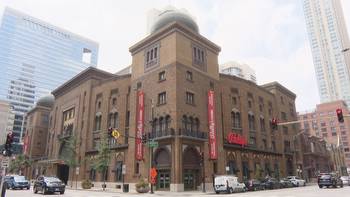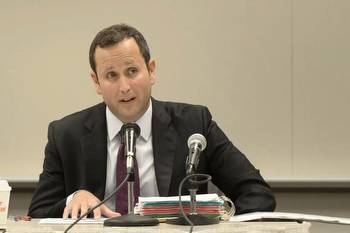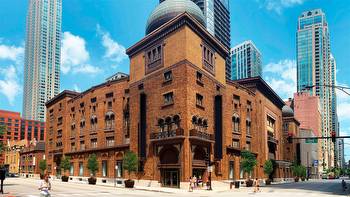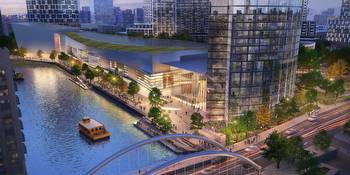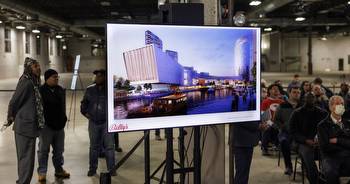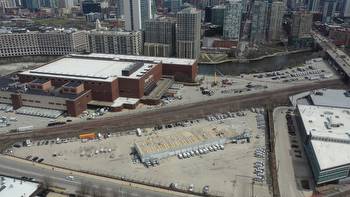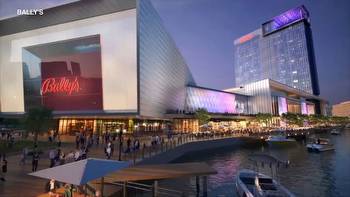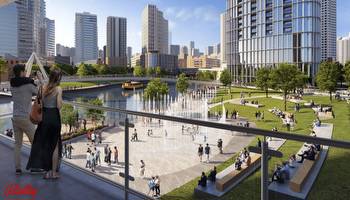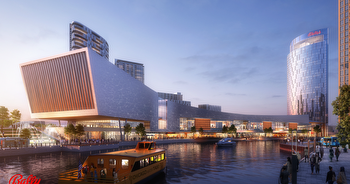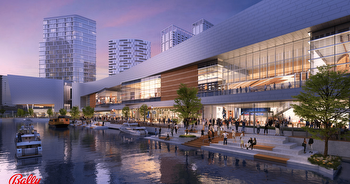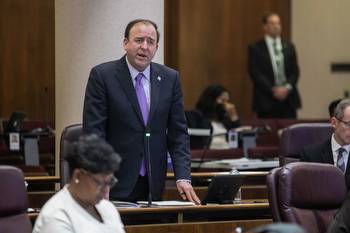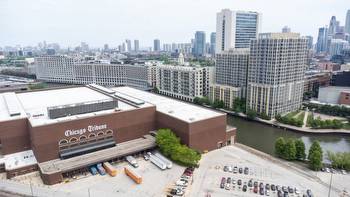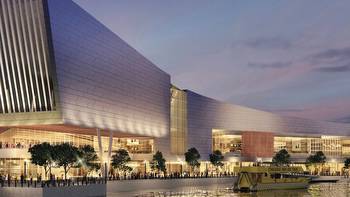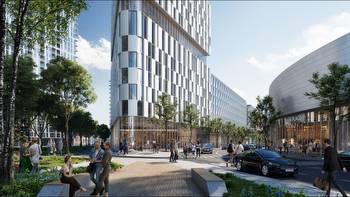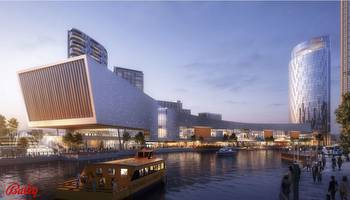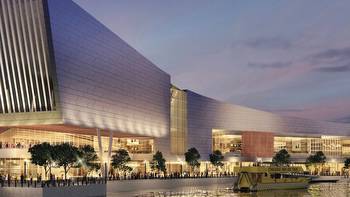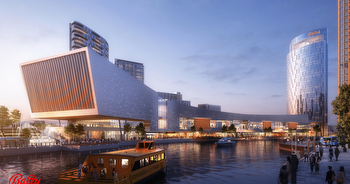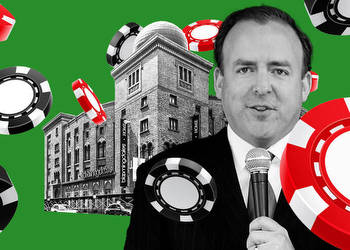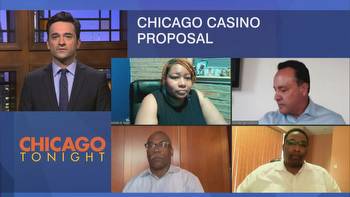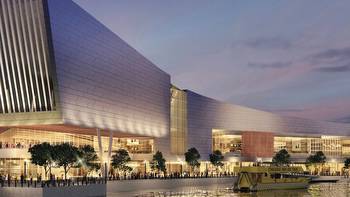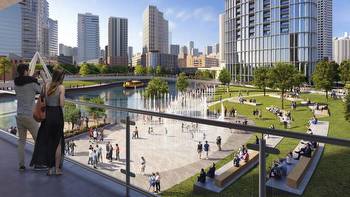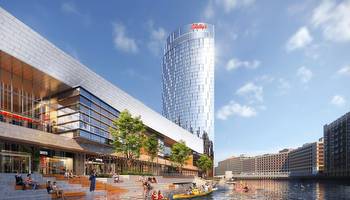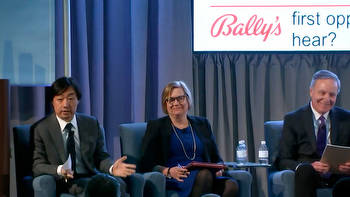Bally's proposal for River West casino wins first key vote, with final City Council approval on tap for Wednesday

CHICAGO (CBS) -- Mayor Lori Lightfoot's push for Bally's to build the city's first casino in the River West neighborhood cleared its first major hurdle on Monday, as a key city panel approved the plan, setting up a final City Council vote on Wednesday.
The City Council's Special Committee on the Chicago Casino voted 27-3 to approve an ordinance authorizing the Bally's casino project, as well as a host agreement outlining various financial agreements the casino operators have made, all but ensuring the plan will pass when the full City Council takes it up.
Within minutes of the committee's vote, the full City Council reconvened Monday afternoon and Ald. Tom Tunney (44th) and Ald. Jason Ervin (28th), the casino's chair and vice chair, moved to "defer" the full City Council vote until Wednesday.
"This is a generational opportunity which the city has been working towards for over 30 years," said Jennie Huang Bennett, the mayor's chief financial officer.
Even if the full City Council approves the plan on Wednesday, the casino project still must be approved by the Illinois Gaming Board.
The first vote on the casino project originally had been expected on Friday, but was postponed until Monday amid ongoing questions from aldermen who had complained the project was being rushed.
If approved by the full City Council and later the Illinois Gaming Board, Bally's plans to open a temporary casino in the landmark Medinah Temple building in River North in the second quarter of 2023, with the permanent casino in River West expected to open in the first quarter of 2026.
Bennett said, if Bally's doesn't meet that timetable, the company must pay "fairly high" damages to the city to make up for lost revenue.
Monday's vote came after the Lightfoot administration agreed to some last-minute changes to the casino agreement with Bally's, to ensure that the City Council would have to approve any future changes that might be negotiated to the deal, and to make sure that Bally's maintains at least 25% minority investment in the project for the first five years.
However, some aldermen still argued the approval process for the casino is being rushed, and that the City Council should have been given more time to review the plan before voting.
"Is there a reason we are moving heaven and earth to get a vote on this today, and this week?" said Ald. Maria Hadden (48th).
Bennett said, while there is no legal deadline the city must meet before restarting the casino selection process from scratch, the Lightfoot administration wants to get the deal in place as soon as possible to begin the Illinois Gaming Board licensing process, and so the city can finalize its 2023 budget proposal.
Ald. Brendan Reilly (42nd), whose downtown ward neighbors the 27th Ward where the Bally's casino complex would be built, praised the Lightfoot administration for making changes to casino plan at request of aldermen in recent weeks, but he said that's why the final vote should be held up for another month to make sure all of aldermen's concerns are addressed.
"Each hearing that we've had, this has gotten a little bit better. Why stop now?" Reilly said.
Lightfoot is counting on the permanent casino to ultimately bring in $200 million a year to help shore up the city's underfunded police and fire pension systems. Another $200 million in annual tax revenue would go to the state.
Reilly, who has been one of the most vocal opponents of Bally's plan, called the projections of $200 million in annual tax revenue for the city "fuzzy math."
"You need to have this casino jam-packed nearly every day of the year, performing at the highest level conceivable," to bring in that much tax revenue for the city, Reilly said. "This casino is going to have to be on super steroids."
Reilly asked if the city could get any guarantees from Bally's regarding the annual tax revenue the permanent casino would generate, but Bennett said any such guarantee would have reduced the $40 million in upfront money Bally's is providing for the project, as well as the ongoing share of casino revenue the city would be able to make.
Ald. Brian Hopkins (2nd), whose ward also neighbors the proposed casino site, said the deal with Bally's should include a provision that would allow the city to renegotiate the terms of the casino deal if the estimated $200 million in annual tax revenue does not become reality
"I don't believe we're going to see $200 million a year in six years from this. I don't believe it. The numbers don't add up," he said. "Our hands will be tied six years from now, ladies and gentlemen. We won't have the ability to correct the mistake we're about to make."
Ald. Walter Burnett, whose ward includes the proposed Bally's site, said he supports the project "100 percent," and said he's not willing to put off a final decision any longer.
"This deal is going to help us to be able to balance our budget, but also to deal with these pension challenges that we're going to have in the future, and I don't know what else we can do. If we postpone this, are we going to miss the boat, and have to come up with something else in order to make these things happen? And what else are we going to do to make these things happen?"
While Burnett has not been enthusiastic about building a casino in his Ward, he has said he supports the project in order to avoid a significant property tax increase that would be needed to help fund police and fire pensions without the casino money.
While the casino project appears to be a done deal at the city level, Reilly said he will continue to fight to block it when it comes up before the Illinois Gaming Board. Reilly has repeatedly said that the vast majority of people who live in his ward, within blocks of the proposed casino, are opposed to the Bally's plan.
"The city process may be coming to a close, but the state process is just beginning, and I think the many thousands of residents who are opposed to this are going to make their voices heard at the Gaming Board," he said.
In addition to the expected tax revenue for the city's pensions, the project also is expected to be a boon for the city's economy, by bringing in new tourism revenue, while creating an estimated 3,000 construction jobs and 3,000 permanent jobs at the proposed casino resort, which would include the casino, hotel, and more. Bally's has promised 60% minority hiring.
According to the mayor's office, Bally's has completed an agreement with the city's labor unions regarding the various casino jobs, which the mayor and aldermen have said would be necessary for the casino project to move forward.
Bally's proposal calls for a $1.74 billion casino at the 30-acre Chicago Tribune Freedom Center publishing plant along the Chicago River near Halsted and Ohio streets.
The Chicago Tribune prints its newspapers – and some competitors' newspapers – at the Freedom Center, but its lease at the site runs out in June 2023, with an option to renew for 10 years. But Bally's also holds an option to purchase the site.
The casino project would include 3,400 slot machines and 173 table games; a 500-room hotel; several locally-owned restaurants and cafés, as well as a food hall; three bars and lounges; a 3,000-seat theater; an extension of the city's Riverwalk, along with a 70,000-square-foot riverfront entertainment venue; 20,000 square feet of exhibition space; a sports museum; and an outdoor/rooftop space with bars, lounges, and pools.
Bally's is also planning on 30 traffic improvement projects. They include adding new traffic signals for entry roads going east from Halsted Street just south of Chicago Avenue, and going south from Chicago Avenue just east of Halsted Street. New signals are also planned for entry roads that run north from Grand Avenue east of Halsted Street.
Also planned is the modernization of traffic signals directly at Halsted Street and Chicago Avenue, and also at Halsted and Erie streets and at Milwaukee Avenue, Ogden Avenue, and Chicago Avenue to the west.
There are also plans for new pedestrian signals at Chicago Avenue and Halsted Street; Grand Avenue at Halsted Street, Desplaines Street, and Jefferson Street; and Halsted and Superior streets.
The casino operator is also planning crowdfunding, where Chicagoans can buy fractional ownership of the facility.
The Bally's bid for this site includes a temporary facility at the Medinah Temple in the River North neighborhood. Originally, Bally's had planned that temporary casino at a site adjacent to the Freedom Center by retrofitting an existing building, but city officials said the Medinah Temple was chosen instead due to its proximity to mass transit, and existing retail and hospitality corridors.
According to a city evaluation report, Bally's expects to open the temporary casino at Medinah Temple in the second quarter of 2023, with the permanent casino likely to open by the first quarter of 2026.
The Medinah Temple was built in 1912 for the Masonic Order of the Mystic Shrine on Wabash Avenue – then called Cass Street – between Ontario and Ohio streets. The ornate Moorish revival building originally housed a 4,200-seat auditorium that over the decades featured events such as the annual Shrine Circus, Chicago Symphony Orchestra recordings, concerts featuring A-listers, and live performances of the radio show "A Prairie Home Companion" with Garrison Keillor. The auditorium featured a 92-rank Austin pipe organ.
In 2001, the Medinah Temple and neighboring Tree Studios artists' residence were redeveloped, and in 2003, a Bloomingdale's Home and Furniture store opened in the Medinah Temple building. The Bloomingdale's store closed in 2020 and the building is now vacant.
The choice to house the temporary casino at Medinah Temple if the mayor's plan is approved is a big victory for its current owner, Friedman Properties.
River North developer Albert Friedman donated $600,000 to Mayor Lightfoot's campaign the same day she narrowed casino bids from five to three.
But with the Medinah Temple being right next to the Grand Avenue CTA Red Line stop, neighbors say they worry a casino there will just add to River North crime – which is already seeing a major spike.
"It is unimaginable that adding a casino is going to make that better somehow," said Brian Israel, president of the River North Residents Association.
Reilly also has vehemently objected to putting the temporary casino in Medinah Temple, and has compared the mayor's overall push for City Council approval of the Bally's casino bid by the end of the month to the infamous sale of the city's parking meters in 2008.
"The last time we were given less than two weeks to vet and approve a deal, it blew up in our faces - and it was called the parking meter deal," he said.
The parking meter deal came around in December 2008 under Mayor Richard M. Daley. The city leased its parking meters to Chicago Parking Meters LLC in a 75-year deal for about $1.16 billion in a move that has been controversial ever since.
The city says the reason they are pushing this so hard is that after City Hall, the state gaming board still needs to weigh in - and they would like to be able to use those Bally's dollars for next budget year.
Some members of the City Council have said the approval process for the casino is moving way too fast, with others saying they and the community are being excluded from what may be one of the largest projects in city history.
Lightfoot has said aldermen have had ample opportunity to weigh in on the casino proposals since they were first unveiled in November, including at community meetings organized for each bid, and multiple closed-door briefings with the mayor's team.
Bally's was one of three finalists for the casino complex, after a total of five bids were submitted to the city in November. The other two finalists were from Rush Street Gaming, for a Rivers Casino in the new development project known as The 78 near the South Loop and Chinatown; and a Hard Rock proposal to build a casino over train tracks in the proposed One Central development near Soldier Field.
Those other finalists were vehemently opposed by the aldermen in whose wards they would have been located.
Lightfoot pushed back against critics of the selection process, suggesting they were upset because they might have supported one of the other finalists.
"Some of what you're hearing is people who've staked their allegiance with proposals that didn't make it through the finalists. It's typical of folks that weren't successful to attack the process," she said.
Some aldermen have indicated they preferred a casino be built at or near McCormick Place, but the mayor's evaluation committee eliminated two such bids from the five proposals when narrowing the list down to three finalists earlier this year.
Bally's was the only casino finalist to offer an upfront payment to the city as part of their bid, a $25 million payment to the city. According to the mayor's office, that initial offer has been increased to a $40 million upfront payment, and an annual $4 million payment thereafter.








